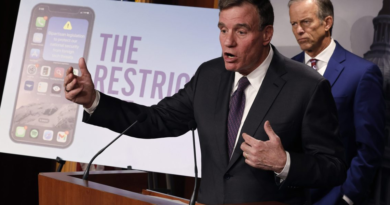The government is giving out $27 billion in 'green bank' loans to help kick start the clean energy revolution
The Biden administration on Tuesday outlined how states and nonprofit groups can apply for $27 billion in funding from a “green bank” that will provide low-cost financing for projects intended to cut planet-warming greenhouse gas emissions.
The so-called Greenhouse Gas Reduction Fund, created by Congress in the landmark climate law approved last year, will invest in clean energy projects nationwide, with a focus on low-income and disadvantaged communities.
The Environmental Protection Agency expects to award $20 billion in competitive grants to as many 15 nonprofit groups that will work with local banks and other financial institutions to invest in projects that reduce pollution and lower energy costs for families.
Another $7 billion will be awarded to states, tribes and municipalities to deploy a range of solar energy projects, including residential rooftop solar, community solar and solar storage.
EPA Administrator Michael Regan said the green bank — modeled after similar banks established in states such as Connecticut, New York and California — will unlock billions of dollars in private investment to enable neighborhoods and communities “that have never participated in the clean-energy economy to participate in full force” in creating green jobs.
Low-income and disadvantaged communities “who pay the largest percent of their income toward energy bills have been left out of the investment game (and) have not seen the infusion of private capital to help them realize opportunities … for lots of reasons,” said Regan, the first Black man to head the EPA.
“What we are focused on here is ensuring that this $27 billion opportunity is thought-out in a way that allows for that community, that population, to be along for the ride,” he added. ”Obviously, if this had been done before, there would be no reason for the Greenhouse Gas Reduction Fund. We are charged with bringing private capital off the sideline.”
The program expects to begin making grant awards this summer and has already received nearly 400 responses to preliminary inquiries, said Jahi Wise, the program’s acting director.
Even before the grants are awarded, Republicans in Congress have taken aim at the green bank, calling it a taxpayer-funded “slush fund” ripe for abuse.
Rep. Gary Palmer, R-Ala., said he will sponsor a bill to repeal the fund, which he said will benefit Wall Street firms but “doesn’t help the American people with their utility bills.
“Will this $27 billion slush fund lower the cost of heating for these American families?” Palmer asked.
Sean Kelly, a spokesman for House Energy and Commerce Chair Cathy McMorris Rodgers, R-Wash., said the fund “allocates an incredible amount of authority and resources” to the EPA, yet lacks measures to ensure accountability or transparency in how the resources are used.
“In other words, this provision creates a taxpayer-funded slush fund for Wall Street and heightens the risk for overspending, fraud and abuse,” Kelly said in a statement. “That is not a responsible way to allocate these resources.”
Democrats were much more optimistic, calling the fund a historic opportunity to cut greenhouse gas emissions, protect public health and create economic opportunity in disadvantaged and under-resourced communities.
“For years, we’ve fought to take the idea of a national climate bank from a vision to a reality. With today’s action from the EPA, we’re one step closer,” said Sen. Chris Van Hollen, D-Md., who pushed for the green bank along with Massachusetts Sen. Ed Markey and other Democrats.
Markey and Van Hollen said in a statement that they will work with EPA to ensure the new fund is national in scope, has a substantial “multiplier effect” with private investment and includes diverse stakeholders, including “communities that have been historically underserved” by banks and other financial institutions.
Learn how to navigate and strengthen trust in your business with The Trust Factor, a weekly newsletter examining what leaders need to succeed. Sign up here.



